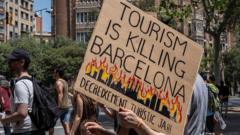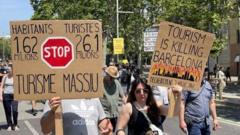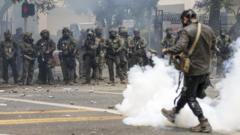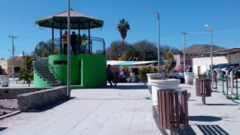This article explores Pope Francis’s ability to navigate complex social dynamics with grace, specifically during his visit to Azerbaijan and Georgia, highlighting the nuances of his diplomatic approach in challenging environments.
**Pope Francis: A Testament to Grace and Diplomacy in Unlikely Settings**

**Pope Francis: A Testament to Grace and Diplomacy in Unlikely Settings**
In remembrance of Pope Francis, we reflect on his impactful interactions during a controversial interfaith outreach tour.
In April 2025, Pope Francis left a remarkable legacy, characterized by his extraordinary interactions during his papacy. A notable instance unfolded almost a decade ago when he embarked on an interfaith outreach tour to Azerbaijan and Georgia, two nations with minimal Catholic presence. This visit’s significance lay not only in his diplomatic endeavors but also in his capacity to embody grace amidst adversity.
Reflecting on his time in Azerbaijan, where a predominantly Muslim population hosted the pope, it was clear that his intentions were geared towards fostering unity and understanding among faiths. At the time of his visit in 2016, there were fewer than a thousand Catholics in Azerbaijan, with locals making up only a small fraction. Georgia remained even less receptive, with the overwhelming majority adhering to Eastern Orthodox traditions, fostering a palpable tension that would greet the pope upon his arrival.
Notably, during his presence in the Georgian capital of Tbilisi, protests erupted, with demonstrators denouncing him as the “Antichrist.” The dissenters attributed his previous statements regarding homosexuality as a trigger for ancient hostilities towards Catholicism from Orthodox factions. Some local priests chose to boycott his Mass, illustrating the fraught religious landscape he was navigating.
Nevertheless, one of the most captivating moments flashed with the backdrop of these geopolitical and social tensions. As Pope Francis made his way to Baku’s lone Catholic cathedral, an unexpected gust of wind knocked his zucchetta, or papal cap, off his head—a symbolic mishap underlined by the tense atmosphere surrounding his visit. While foreign journalists observed this unfolding scene, the silent anxiety of a local Azerbaijani trumpeter became apparent, as he recognized the potential implications of this slip in the highly controlled setting.
What followed became both a surprising and poignant gesture of humanity. In a bold maneuver that might have felt perilous in such a controlled political climate, the trumpeter approached the pope and retrieved his cap—placing it back upon his head. This act of kindness and quick thinking not only salvaged what could have been an awkward moment but stood as a testament to the unexpected connections that can arise amid political and religious strife.
Throughout this interaction, Francis remained unfazed, embodying a calm resilience that reflected his overarching mission: to bridge divides through dialogue and understanding. This narrative of his engagement in Azerbaijan and Georgia highlights how the pope consistently sought to uplift the universal message of peace and acceptance, reminding us all of the power of empathy in the most challenging situations.
As the world remembers Pope Francis, reflections on such moments serve as a reminder of his lasting influence on interfaith diplomacy and the importance of approaching differences with grace and understanding.
Reflecting on his time in Azerbaijan, where a predominantly Muslim population hosted the pope, it was clear that his intentions were geared towards fostering unity and understanding among faiths. At the time of his visit in 2016, there were fewer than a thousand Catholics in Azerbaijan, with locals making up only a small fraction. Georgia remained even less receptive, with the overwhelming majority adhering to Eastern Orthodox traditions, fostering a palpable tension that would greet the pope upon his arrival.
Notably, during his presence in the Georgian capital of Tbilisi, protests erupted, with demonstrators denouncing him as the “Antichrist.” The dissenters attributed his previous statements regarding homosexuality as a trigger for ancient hostilities towards Catholicism from Orthodox factions. Some local priests chose to boycott his Mass, illustrating the fraught religious landscape he was navigating.
Nevertheless, one of the most captivating moments flashed with the backdrop of these geopolitical and social tensions. As Pope Francis made his way to Baku’s lone Catholic cathedral, an unexpected gust of wind knocked his zucchetta, or papal cap, off his head—a symbolic mishap underlined by the tense atmosphere surrounding his visit. While foreign journalists observed this unfolding scene, the silent anxiety of a local Azerbaijani trumpeter became apparent, as he recognized the potential implications of this slip in the highly controlled setting.
What followed became both a surprising and poignant gesture of humanity. In a bold maneuver that might have felt perilous in such a controlled political climate, the trumpeter approached the pope and retrieved his cap—placing it back upon his head. This act of kindness and quick thinking not only salvaged what could have been an awkward moment but stood as a testament to the unexpected connections that can arise amid political and religious strife.
Throughout this interaction, Francis remained unfazed, embodying a calm resilience that reflected his overarching mission: to bridge divides through dialogue and understanding. This narrative of his engagement in Azerbaijan and Georgia highlights how the pope consistently sought to uplift the universal message of peace and acceptance, reminding us all of the power of empathy in the most challenging situations.
As the world remembers Pope Francis, reflections on such moments serve as a reminder of his lasting influence on interfaith diplomacy and the importance of approaching differences with grace and understanding.




















